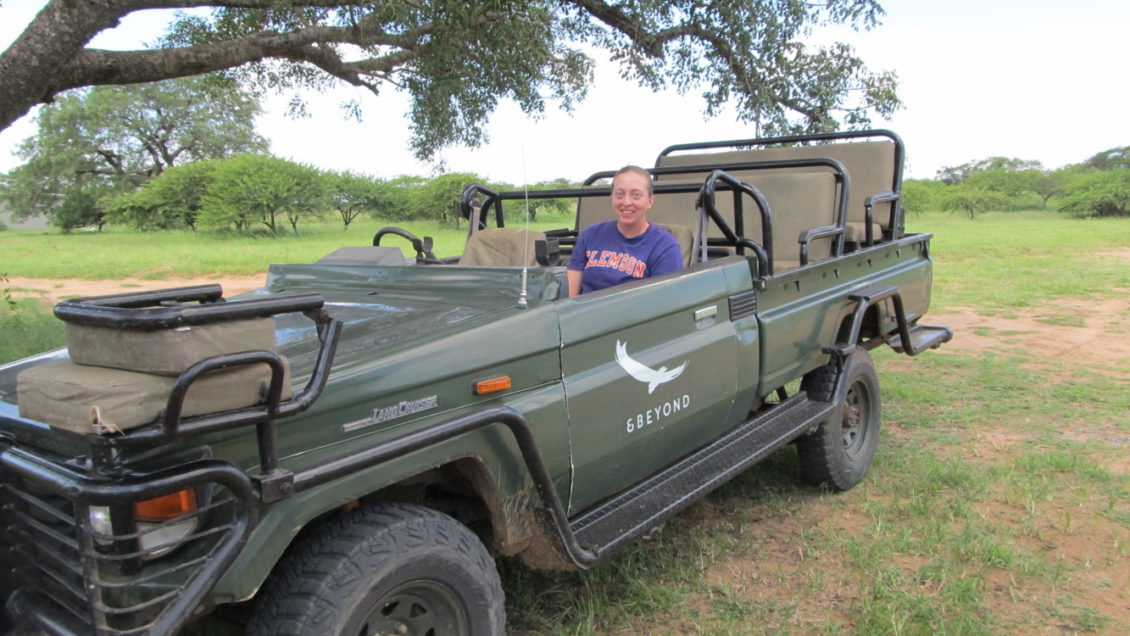CLEMSON — Laura Gigliotti, wildlife and fisheries biology doctoral student at Clemson University, travels to South Africa to further her research on how to advance the recovery of cheetahs.
Before beginning her career at Clemson in 2016, Gigliotti studied snowshoe hares while earning her master’s in wildlife and fisheries science at Pennsylvania State University, which eventually led to her to Clemson’s doctoral program in wildlife and fisheries biology.

“I was really drawn to Clemson’s program because I was excited about the research (on cheetahs) and the type of questions I could answer,” said Gigliotti. “My junior year of college I spent a semester in South Africa doing a field studies program. I had a chance to collect field data and conduct independent research which helped me decide to stay within the ecological sciences and eventually research cheetahs here at Clemson.”
Gigliotti focuses her research on a population of cheetahs living on a fenced-in reserve in South Africa.
“The reserve was established back in 1992, and cheetahs and lions were reintroduced into the area at this time,” said Gigliotti. “Cheetahs and lions had historically been in this part of South Africa but were eliminated through hunting and predation. I’m looking at how different factors such as the size and habitat use of other predator populations, such as lions, and prey affect the reproduction and survival of the cheetahs in this reserve.”
Although the cheetahs are carefully protected at this reserve, cheetahs worldwide are currently listed as vulnerable animals and potentially a soon-to-be endangered species.
“Cheetahs are currently listed as a threatened species,” Gigliotti said. “Right now, it’s estimated that there are only about 7,000 individuals left in the wild and the populations that are remaining face a lot of threats like habitat fragmentation and the rise of urbanization. Wildlife biologists and ecologists like myself are interested in conservation so these animals will not become extinct.”
Gigliotti is supported at Clemson by a R.C. Edwards Graduate Recruitment Fellowship, a highly competitive fellowship awarded by the graduate school that enables Clemson to recruit high-caliber doctoral students. She has also been awarded the Kaplan Graduate Award, a prestigious honor awarded to only six students per year worldwide, from Panthera, a nonprofit organization dedicated to the conservation and protection of large cats and their ecosystems around the world.
With this support, Gigliotti travels to South Africa, once or twice a year to see her research up close and personal.
“At least half of my dissertation is analyzing historical data,” Gigliotti said. “However, I was lucky enough to figure out a few ways to fund these field-based projects. It’s a really great experience (to travel to South Africa) because I can actually see the system first-hand. My first experience was just this past spring. I’d spent two years looking at data and maps and reading papers, but actually seeing it in person definitely helped my perspective of what I am actually studying.”
Despite the rise of urbanization and the decrease of their habitat size, Gigliotti’s research, along with the efforts of the reserve, allow first-hand studies of cheetahs in their habitats and the ways in which they react to threats from other predators.
“Cheetahs are mid-ranking predators in the system there whereas lions and leopards are the top-ranking predators, so we can ask some interesting questions about how multiple species of predators interact,” said Gigliotti.
“One of the things I’m interested in looking at is how top predators, like lions and leopards, affect the behavior of cheetahs and how environmental factors might influence these behavioral responses. When we find a cheetah, we’ll take five minutes of video of the cheetah sitting there and then play a ten second clip of either a lion sound, a leopard sound, a hyena sound or a bird sound, which we use as a control. Then we record the cheetah’s behavior for five minutes, to see how the cheetah reacts to the sound while also looking at environmental influences. For example, responses to predator sounds may vary if a cheetah is in an open area versus an area of dense vegetation. If a cheetah is in an area where we know lions typically hang out, the cheetah may think it’s at a much greater threat because they are in as a risky area. Sometimes cheetahs take off running and other times they are more comfortable in their location, even with a lion roaring.”
David Jachowski, an assistant professor of wildlife ecology in the department of forestry and environmental conservation, advises Gigliotti and her research on cheetahs.

“I’ve been working in South Africa about 10 years now and we knew there were some really interesting questions about restoring big cats to that landscape and some of the successes they’ve had and how learning more about their successes could translate,” Jachowski said. “I did a national search for students and (Gigliotti) came to us from a really strong wildlife ecology lab at Penn State. It’s pretty rare for a student to not only win such a prestigious university-wide fellowship awards but also acquire funding to travel and conduct their own international research. We are fortunate to be able to recruit students like Laura here to Clemson.”
Gigliotti will return to South Africa later this year and finish her research. After graduating, her ultimate goal is to remain in academia or in a position that will allow her to continue research in the ecological sciences.
In addition to the research funding she receives from R.C. Edwards Graduate Fellowship and Kaplan Graduate Award, Gigliotti’s work is supported by Panthera, a nonprofit organization dedicated to the conservation and protection of large cats and their ecosystems around the world.
Get in touch and we will connect you with the author or another expert.
Or email us at news@clemson.edu

